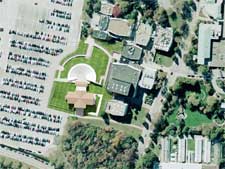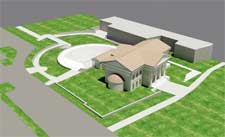KINGSTON, R.I. – June 25, 2009– The University of Rhode Island will have a building of classical Greek architecture with an open air theater on its Kingston campus, thanks to the efforts of the Rhode Island chapter of Paideia, a non-profit Greek-American organization dedicated to advancing learning about classical and modern Hellenic culture and language.
Groundbreaking ceremonies for the Hellenic Studies Center Paideia, free and open to the public, will be held Tuesday, June 30 at 3 p.m. under a tent at the construction site, just behind the Fine Arts Center. A reception will immediately follow the ceremony.
The Hellenic Studies Center Paideia is comprised of the Rodos Educational Building, the Ayios Loukas Greek Orthodox Chapel, and a Classical theater.
In an agreement with the University, Paideia will lease the land and construct a 22,000 square-foot complex. The Rodos educational building will showcase Byzantine architecture, art and history in an authentic venue. The building will contain classrooms, a small lecture hall, offices, a library, archival storage, the chapel, and exhibit space. A replica of the three pillars from the Acropolis of Rodos will be a prominent feature of the building. The facility will allow expanded curriculum offerings centered on Greek language, culture, and history and serve as home to the URI Humanities Center.
The theater, patterned after the ancient theaters of Greece, will showcase educational and cultural events and serve as a valuable resource not only to URI, but also to other universities, secondary and elementary schools in the state and the surrounding region. There will also be an outdoor Socratic corner for gatherings. Construction for the project is expected to be completed within two years.
The indoor and outdoor spaces will facilitate social and intellectual engagement with the public, linking the ancient and modern worlds.
 The estimated $5 million project will be funded through the generosity of Greek-Americans not only from Rhode Island and Southeastern New England, but also from the United States, Greek-American organizations, and the support of Philhellenes, friends of Greek culture. A number of Greek-American organizations and individuals have pledged their financial support. Architectural and landscape plans and the excavation and concrete foundations have already been committed to Paideia at no cost. Similar Hellenic centers have been built or are currently under way on college campuses across the country.
The estimated $5 million project will be funded through the generosity of Greek-Americans not only from Rhode Island and Southeastern New England, but also from the United States, Greek-American organizations, and the support of Philhellenes, friends of Greek culture. A number of Greek-American organizations and individuals have pledged their financial support. Architectural and landscape plans and the excavation and concrete foundations have already been committed to Paideia at no cost. Similar Hellenic centers have been built or are currently under way on college campuses across the country.
“Many of our core values and basic institutions derive from Greek civilization,” said URI President Robert L. Carothers. “The presence on the Kingston Campus of a center for the study of classical Hellenic thought and art will give us a richer appreciation of the past and help shape more thoughtful and reflective graduates for the future. We are very proud of our continuing relationship with the Greek American community in Rhode Island.”
This groundbreaking marks the last day of Carothers’ presidency. The president has supported this project since its conception.
Classical offerings at URI far exceed ancient and modern Greek language classes and mythology courses. In fact, Greek-related courses are infused throughout the URI curriculum. The University estimates that more than 2,000 students each year take courses with a Hellenic focus—in history, philosophy, writing and rhetoric, art and art history, English, political science, communication studies, theatre, and women’s studies.
A number of faculty members are immersed in Greek research and projects. For example, URI Professor Mary Hollinshead, a professor of art history, is a well-recognized Classical archaeologist. Greek architecture is a major focus of her research and the Aegean Bronze Age has been a longtime interest. She has written about the function of Greek temples, and currently writing a book on Greek monumental steps and ceremonial behavior. She has excavated at sites in Greece on land, and joined Dr. Robert Ballard of URI surveying the deep-sea bed of the Aegean.
New Zealander Dr. Bridget Buxton of URI’s History Department is also a Classical archaeologist at Robert Ballard’s Institute for Archaeological Oceanography, with many years of archaeological experience in Greece and other Mediterranean countries. She is involved in several ongoing underwater archaeology projects, including (this summer) a deepwater search for ancient Minoan.
Buxton and Hollinshead are members of URI’s Archaeology Group, a team of faculty who teach archeology and related courses in the departments of art, history, anthropology, and philosophy. All six members are collaborating on a new introductory undergraduate course called “Archaeology Frontiers” that will introduce students to some of the great adventures of Greek archaeology in its pioneering days.
Students initiated a Classics Society last year, designed to convey the liveliness and pertinence of antiquity in modern life. The society’s 50 members plan activities such as Classically-themed movie nights (Troy) and donning togas for Higher Education Day at the State House.
“The entire Greek community, in Rhode Island and across the country, is very excited to see this project come to fruition and has wholeheartedly supported the concept from its inception. We look forward to the ground breaking and the completion of this stunning facility. The Hellenic Studies Center Paideia will be, without a doubt, a world class facility that will be enjoyed by generations to come,” said John Lyssikatos, president of the Rhode Island Chapter Paideia.
The building will be named “Rodos” after the Greek Isle of Rhodes (Rodos) and Rhode Island. (The leading theory on how Rhode Island got its name says that Giovanni da Verrazano, after viewing Aquidneck Island in 1524, wrote to the King of France saying that the island reminded him of the Isle of Rhodes.)
3D digital modeling provided courtesy of Dimitris Vlachopoulos

